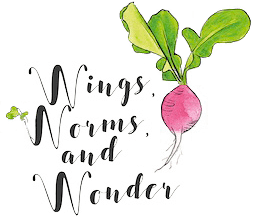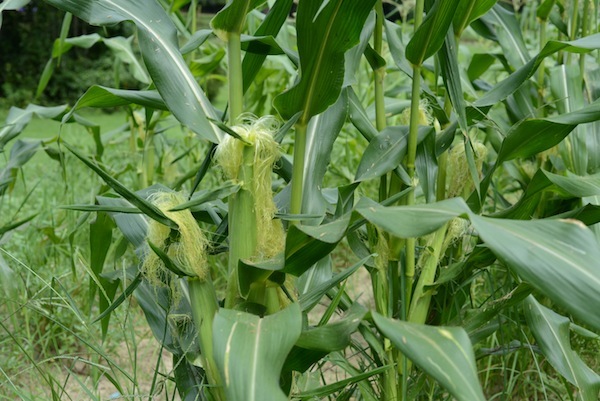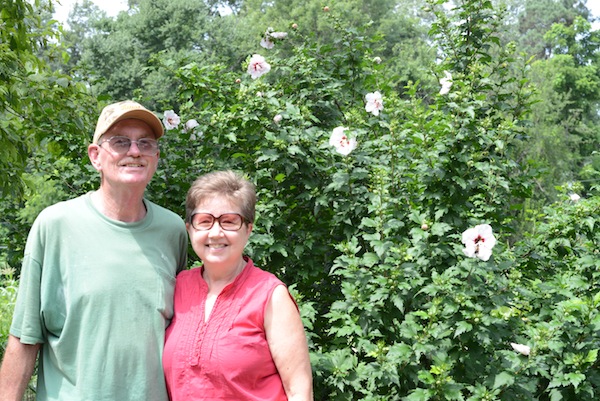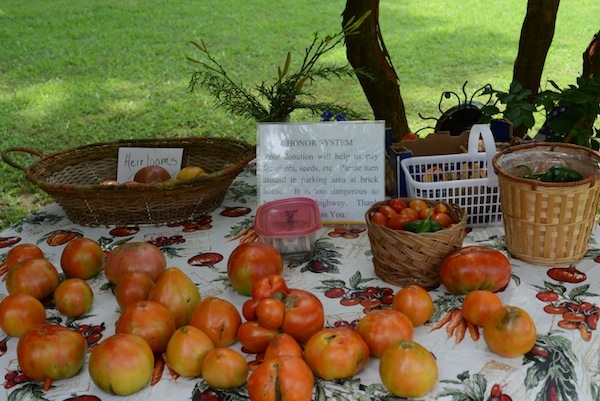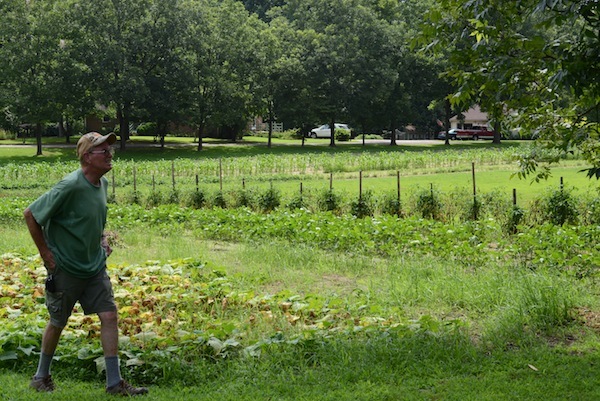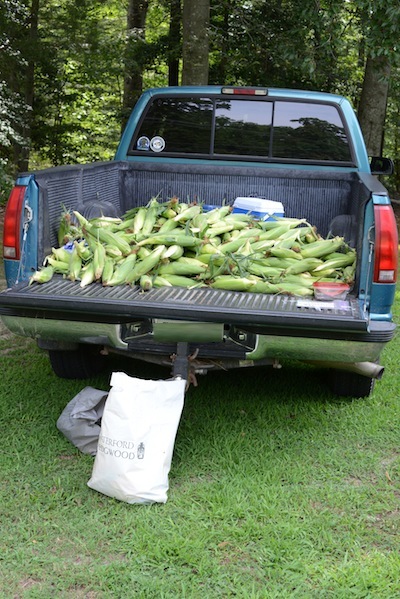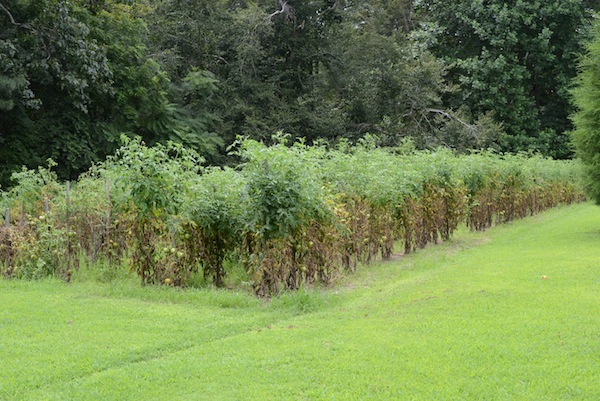Summer Interviews! Place-based Living with Kent and Gwen Ellyson, Part 1
Laurie Lane-Zucker, Orion’s Executive Director, stated that, “A process of disintegration occurs as basic connections to the land fray and communities become less resilient and less able to deal with the dislocations that globalization and ecological deterioration bring about. [As people lose connection to place and land] A community’s health–human and more-than-human suffers”(2004).
Sweet corn just about ready to eat!
Discovering our connections to place and providing the children in our lives consistent opportunities to connect with place in deep and meaningful ways is one of the most important life lessons we can share. In the past fifty years it has become a cultural norm to move around often and usually far away from the lands of our relatives. It takes work to connect with place and discover what about a certain place resonates with you and it is not often that we have the privilege of connecting with someone who has an inherent connection to place and a love and understanding of the land on which they live.
I feel incredibly fortunate to have grown up with relatives who had a deep connection to the land. I may have lived in the suburbs myself, but I rejected that lifestyle early on and I attribute that wisdom to an unconscious understanding gained by the growing up I did with these relatives who lived and worked the land on which generations of our family did the same. As an adult I have gotten to know my relatives in a new capacity and feel a deep connection to people and place because they literally helped create me mentally and on a cellular level–through the food they grew and I ate (and am still fortunate it eat!!) and the wisdom I absorbed.
At one point 3 generations lived in this house and 4 enjoyed this land all together.
Today I am so happy to introduce you to my cousin (really my mom’s cousin, but we’re all cousins right?) Kent Ellyson and his wife Gwen. Kent and Gwen live on, and raised their daughters on, the land on which Kent grew up and lived with his parents and my great-grandparents. They have farmed and hunted this land for generations and some of my earliest memories are of sitting outside eating carrot raisin salad there with everyone, including my then 94 year old great-grandmother. Gwen grew up nearby and Kent and Gwen were high school sweethearts and to me, they are about as close as you get to place-based perfection. Since my grandfather died, I have felt a great security in knowing that I have Kent to consult when I am not sure on how to grow certain things and when I have a question on growing flowers, Gwen is the lady to ask!!
Kent and Gwen, true blue!
I think all the traveling I have done over the past year has really gotten me thinking about place (more than usual), so this week is all about place connection and I am really excited to share Tuesday and Thursday interviews with Kent and Gwen sandwiching a lesson on using writing to facilitate place-based connections! So, let’s hear what they have to say!
It’s Where I was Born and Where I Wanted to Stay: An Interview with Kent Ellyson
You’ve lived on this land without break since you were born 63 years ago, how do you think growing-up here and growing your own food connected you to place? And of course what is your favorite thing to grow and why?
Kent: Tomatoes, I like the different varieties of fruit. Growing up my dad didn’t want me in the garden [Uncle Granville had his precise ways of doing things] so I couldn’t garden until after my dad couldn’t and then I got into gardening. This is where I was born and this is where I wanted to stay.
They have a small honor system farm stand at the end of the driveway where they generously share the bounties of their harvest with their community.
That makes so much sense. I do think it’s funny that you were kept out of the garden as a child and now you are such an amazing gardener! Perhaps, because a connection to the land was modeled, rather than spoken, to you (and your brother Gerry) you grew up with an understanding that you are inherently connected to the land that fed and housed you. I really believe that what seems so normal to you is so misunderstood by many people in our culture who continue to search for connection. Shifting from your parents’ to your children’s experience on this land, what was your favorite garden experience memory with your own daughters?
Kent: [My favorite memory is when] their grandfather would put the veggies on the steps [as a surprise] for when they’d wake up–this was just normal for them and when we’d go out and they’d like to dig up the sweet potatoes that Grandaddy missed.
Like a treasure hunt! It’s funny because your daughters are around my age and I remember being especially excited about the sweet potatoes that would come from y’all and my grandpa too (Kent’s mother’s brother) and how they would be funny shapes. I used to like to go out and see them growing all over the place too! I especially love how the multi-generational aspect of place is inseparable in your/our experience. My mom has always told us great stories of all the things y’all used to do out here as kids in the woods from sunrise to sunset, and not to mention all the amazing food. Do you remember a particular childhood nature experience that sparked your sense of wonder and secured your connection to this place?
Kent: All the nature. Watching the birds, climbing trees, going in the woods, picking up nuts–I was immersed. When I got home from school I went straight outside.
I snapped this one when Kent wasn’t looking!
What gardening tip can you share from your lifetime of experience?
Kent: Plant twice as much as you need so you’ll have enough for yourself–and the bugs, deer, and weather.
Lastly, the question I am always curious about and ask everyone I interview, what is your favorite smell in nature and is there a story why?
Kent: Honeysuckle, [it is the] sweetest smell, still to this day, picking it and eating it.
Serve yourself sweet corn!
I totally agree. Thank you for letting me talk you into this interview and sharing your thoughts and connections! I wish everyone could come and absorb from you what I feel when I am here! I encourage everyone to remember or discover a place where you can feel connected and even if you can’t be there everyday, hold on to it and draw inspiration from those place-based connections in your daily life!
I would love to hear all your experiences, so share in the comments the places where you feel most connected!
Seeds to Sprout:
Want to learn the essence of place-based education from the leading expert? Check out David Sobel’s book from the Orion Nature Literacy Series Place-Based Education: Connecting Classrooms and Communities or this shorter excerpt by Soble of the same title
Did you miss this May post on honeysuckle? No problem, check it out now!
Tomorrow is Wonder Wednesday! Sign up for the newsletter and have the Wonder Wednesday lesson plans delivered right to your virtual door each month.
Here is an annotated list of place-based education sources by the Place-Based Education Research and Studies
A printable PEEC brochure on the benefits of place-based connections and education that supports these connections
Works Cited
Sobel, David. Place-Based Education: Connecting Classrooms and Communities. Great Barrington: Orion, 2004. Print.
So many tomatoes!
